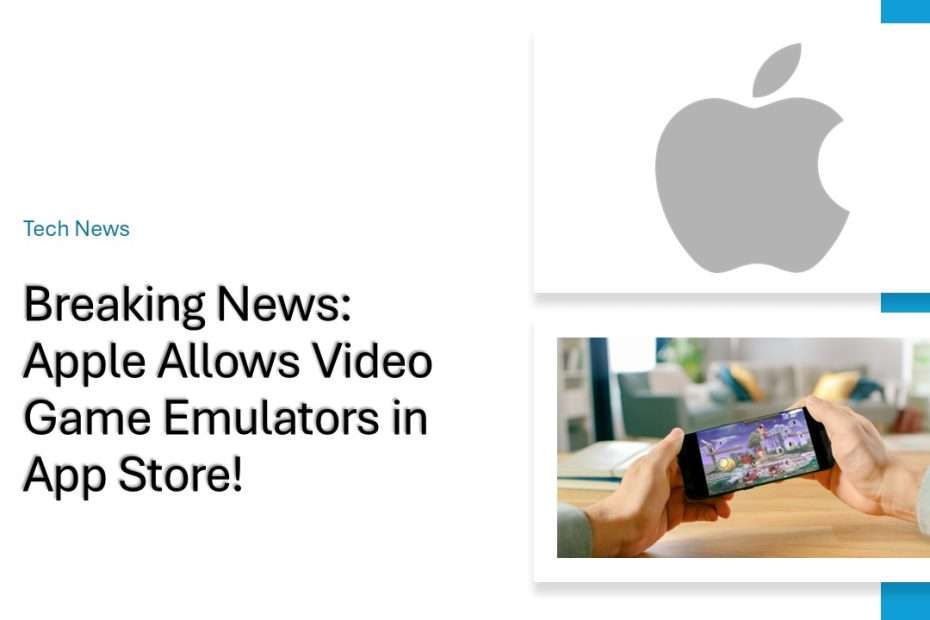Apple has recently updated its App Store guidelines worldwide to now permit video game emulators, a change spurred by the EU’s new DMA laws. This shift in policy means developers can offer game downloads within these emulator apps and even include in-app purchases for them. The updates are a response to the evolving landscape of regulations, particularly in Europe, where laws are driving companies like Apple to adjust their practices. These changes mark a significant departure from previous restrictions and are seen as a positive outcome resulting from government oversight.
The App Store, often compared to a continuously edited Wikipedia page, now allows game emulators in its listings, signaling a notable shift in Apple’s approach. This decision has broader implications, illustrating how regulatory pressure can influence tech giants’ policies for the benefit of users. With the updated guidelines, developers have a new avenue to provide gaming experiences through emulators, a change that was previously restricted. Apple’s move reflects an ongoing effort to comply with regulations while also adapting to meet user demands for more diverse app offerings.
Apple’s previous stance on game emulators and apps offering additional game downloads within their platforms has been strict, considering them akin to mini app stores. This policy has been consistently enforced, with rare exceptions such as Roblox slipping through the cracks. However, a notable change has occurred: app developers are now permitted to offer a range of software that is not embedded in the binary. This includes mini apps, mini-games, streaming games, chatbots, plug-ins, and game emulators, marking a significant shift in Apple’s approach to app content.
This update means that app makers now have the green light to introduce a variety of new functionalities and experiences to iOS users. From mini-games to chatbots and game emulators, this broader allowance provides developers with more creative freedom. This move by Apple represents a departure from its previous stringent guidelines and opens up possibilities for a more diverse and engaging app ecosystem on iOS devices.
The updated guidelines from Apple now explicitly permit retro game emulation apps to offer game downloads. This change has sparked speculation about the potential for a surge of apps featuring classic games from companies like Capcom and Nintendo. However, there’s a crucial caveat to consider. Apple emphasizes that developers are accountable for ensuring their apps adhere to legal requirements. This means that if an app contains copyrighted content, such as a collection of Mario games in a Nintendo-emulating app, the responsibility lies with the developer in the event of legal action from the copyright holder, not Apple.
The recent policy change by Apple, allowing retro game emulation apps to offer downloads, hints at a potential influx of classic games into the App Store. This shift provides excellent opportunities for enthusiasts to create emulators for beloved Nintendo titles and other classics. However, it’s crucial to recognize that not all developers may be willing to risk potential copyright infringement. Instead, some developers may choose to focus on developing original titles or legally accessible games, diversifying the offerings within these emulator apps. This balance ensures that while classic games may see a resurgence in availability on iOS devices, developers must navigate the legal landscape to bring these experiences to users within the bounds of copyright law.
This recent change by Apple, allowing retro game emulation apps to offer downloads, appears to be a direct response to the EU’s Digital Markets Act, which has been pressuring the company to adjust its App Store policies. Apple has previously made minimal changes, often with a perceived lack of genuine effort, and initially only for iOS users in the EU. However, this time, the alteration applies to all regions, suggesting a broader acknowledgment of the evolving regulatory landscape.
The question arises: is Apple’s motivation purely financial? With the potential for a surge of classic game offerings, including Nintendo titles and other beloved classics, it’s plausible that Apple sees an opportunity for increased revenue. By permitting game emulators and downloads within these apps, Apple opens avenues for developers and enthusiasts alike. This move aligns with Apple’s ongoing efforts to adapt to regulatory changes while also potentially capitalizing on the demand for nostalgic gaming experiences on iOS devices.
Apple’s decision to allow retro game emulation apps to offer downloads could potentially lead to the company taking a cut from every retro game purchase made for iPhones. While this market may not be massive, it presents a viable opportunity for Apple to generate additional revenue. Additionally, this move could portray Apple as benevolently opening up its platform, enhancing its image in the eyes of users and developers alike.
This change may also bring stability to the game emulator world. Recent legal actions, such as Nintendo’s lawsuit against the Switch emulator Yuzu resulting in a $2.4 million settlement, have had a chilling effect on emulator development. Typically, emulator makers don’t provide games with their software, leaving users to source and load games themselves. However, with Apple now permitting emulators and game sales on its platform, this landscape might shift. The possibility of an official Nintendo app offering retro games for purchase, especially those only available through Switch console subscriptions, could become a reality. Moreover, the anticipated increase in retro game availability on iPhones may drive sales of add-on controllers, further enhancing the gaming experience for users.
Maybe you liked other articles?

